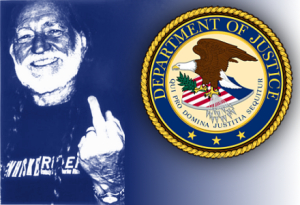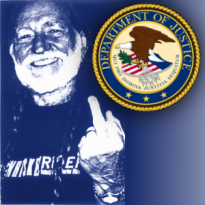 The US Department of Justice has submitted its legal response to the pre-trial motion to dismiss filed by indicted Black Friday principals John Campos (SunFirst Bank vice-chairman) and Chad Elie (payment processor/husband of a Playboy Playmate). Forbes’ Nathan Vardi got a hold of a 51-page document filed by DoJ officials in Manhattan on Friday that unequivocally states “the conduct alleged in the Indictment – a scheme through which the charged defendants abused the US financial system in order to fund their illegal operations – amounts to clear violations of the statutes charged.”
The US Department of Justice has submitted its legal response to the pre-trial motion to dismiss filed by indicted Black Friday principals John Campos (SunFirst Bank vice-chairman) and Chad Elie (payment processor/husband of a Playboy Playmate). Forbes’ Nathan Vardi got a hold of a 51-page document filed by DoJ officials in Manhattan on Friday that unequivocally states “the conduct alleged in the Indictment – a scheme through which the charged defendants abused the US financial system in order to fund their illegal operations – amounts to clear violations of the statutes charged.”
Apparently, the DoJ is using the filing to make explicitly clear its belief that offering online poker is illegal under the 2006 Unlawful Internet Gambling Enforcement Act (UIGEA). They argue that if poker was truly the exception to the rule, lawmakers would have specifically stated as much in the UIGEA’s wording. Instead, the DoJ points to lawmakers’ decision to insert the phrase “subject to chance” rather than the original, looser definition of “predominantly subject to chance.”
The DoJ knocks Campos/Elie’s argument that, as a game of skill, poker isn’t covered by the Illegal Gambling Business Act because the player has a greater role in the outcome than, say, the sports bettor. The DoJ counters that sports bettors can (and do) utilize superior knowledge of the teams and the game to improve their chances. This site has long espoused the notion that (successful) sports betting is heavily dependent on skill, so we’re glad to see the DoJ talking some sense here. (And, um, agreeing with us? Wow… If this was an online dating site, we’d be halfway to the altar.)
The DoJ flatly rejects the idea that the online poker companies weren’t “conducting” business in the states in which they were charged. The DoJ notes that the defendants’ motion failed to cite a single case to support their belief that “conducting business in a particular state requires more than allowing players in the state to place bets on a gambling website hosted elsewhere.” As for the notion that it can’t be bank fraud when the banks didn’t lose any money processing poker transactions, the DoJ claims the banks were nonetheless exposed to loss via possible chargebacks on e-check processing long after the fact.
Legal arguments aside, the new DoJ filing alleges that PokerStars’ head Isai Scheinberg once tasked an organized crime associate with tracking down Elie after the payment processor transferred $4m of PokerStars’ cash to his personal accounts. (We assume that keeping a Playmate in the life to which she’s become accustomed is an expensive proposition.) This Mafioso, who the DoJ allege was involved in the payment processing, must have ultimately cornered his quarry, because Elie returned some of Stars’ money and Scheinberg and Elie went back to doing business as usual. Unlike US Attorney Preet Bharara likening Full Tilt Poker to a Ponzi scheme at a press conference, this Mafia reference was made in the filing itself, meaning the DoJ could be required to substantiate this claim at some later date. (Based on the mere mention of organized crime, we expect a photo finish between the American Gaming Association’s Frank Fahrenkopf and the former law enforcement officials at FairPlayUSA to see who issues the first “I told you so” press release.)
Finally, Forbes’ Vardi caught a notable flaw in the DoJ’s logic. Their filing referenced that pungent slice of 1970’s music cheese, The Gambler, to make the clichéd point that you have to “know when to fold ‘em”. Bharara was only 10 when that Grammy-winning ditty was released in 1978, so we guess he can be forgiven for thinking it was Willie Nelson who recorded it, instead of fried chicken magnate Kenny Rogers. Damn, it was bad enough when the IRS hit Willie with a $32m tax bill and various branches of law enforcement all busted Willie for weed possession, but now the DoJ’s confusing the Red Headed Stranger with the Islands In The Stream guy? For shame…
